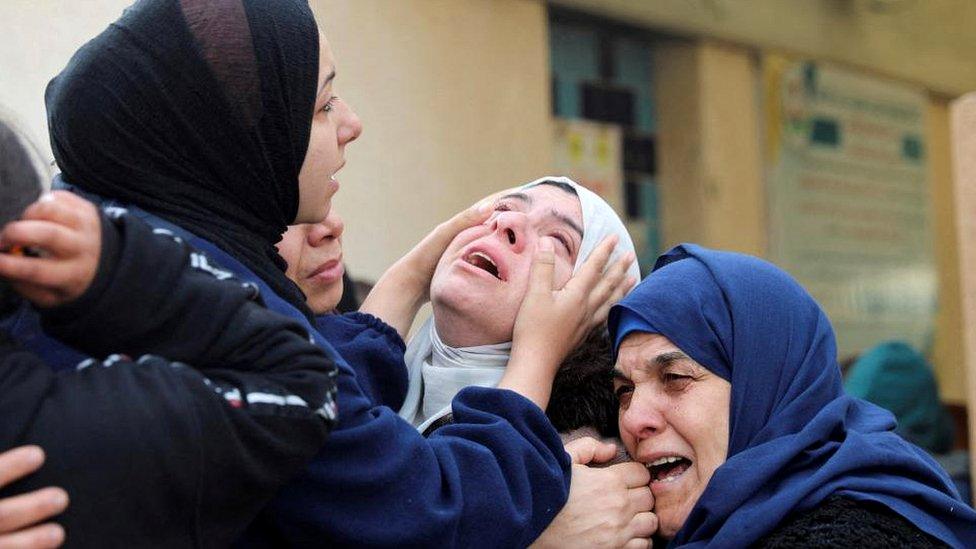Has Israel taken enough action to prevent alleged incitement to genocide?
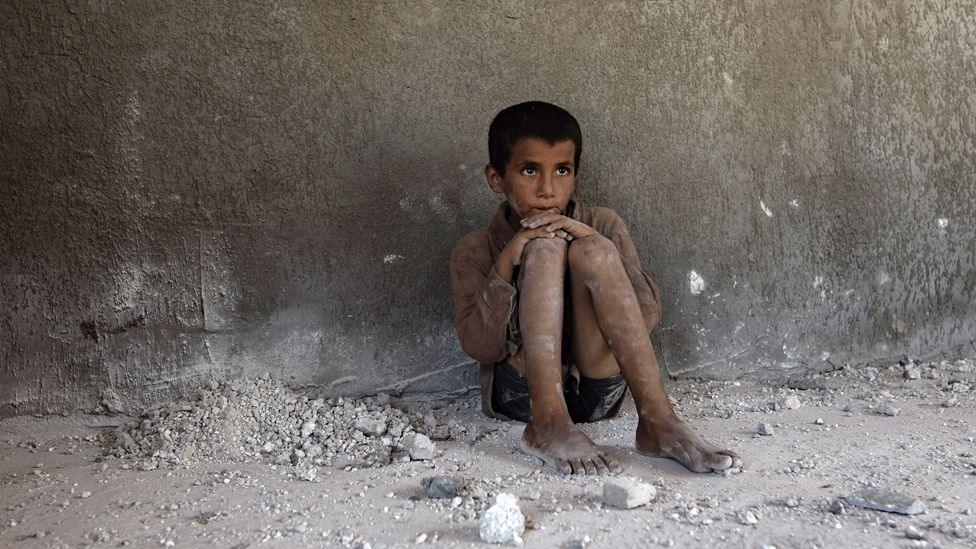
Up to 1.9 million people in Gaza - 90% of the Strip's population - are internally displaced, according to the UN
- Published
“Burn Gaza now, nothing less!” When the deputy speaker of Israel’s parliament, the Knesset, posted this comment on X in November, the platform blocked him and asked him to delete it.
Nissim Vaturi did as they asked, and his account has since been reactivated, but he did not apologise. His comment is one of many controversial remarks that have been made by some high-profile Israelis as the country’s armed forces carry out air strikes and ground operations in Gaza, in response to Hamas’s deadly attack on Israel on 7 October.
On the day of the attacks, he had posted: “Now we all have one common goal - erasing the Gaza Strip from the face of the Earth, external.”
That post, which is still visible on X, was cited in South Africa’s case against Israel at the International Court of Justice (ICJ), in which South Africa alleges Israel is committing genocide against the Palestinians, in the Gaza war. Israel has called the case "wholly unfounded" and based on "biased and false claims".
As part of an interim judgement in January, the ICJ ruled that Israel must prevent public statements inciting genocide. Although the court does not have the power to enforce this, Israel agreed to submit a report detailing the action it had taken to investigate and prosecute possible instances of incitement. The court confirmed that the report was received in February, but has not made its contents public.
Some legal experts believe Israel is not doing enough to investigate potential cases. “Israelis who incite genocide or use genocidal rhetoric are immune from prosecution,” says Israeli human rights lawyer, Michael Sfard.
Proving incitement to genocide, which is a crime under international and Israeli law, is difficult. Genocide is defined as acts intended to destroy, in whole or in part, a national, ethnical, racial or religious group. But distinguishing between inciting genocide and inciting violence or racism - and what could be considered free speech - can be complex.
The BBC has looked at several pronouncements made since the ICJ’s order to see if they could break the ruling and consulted legal experts for their assessment. And although this judgement was directed at Israel, we have also examined language used by some Hamas officials who have made speeches about repeating their attack of 7 October.
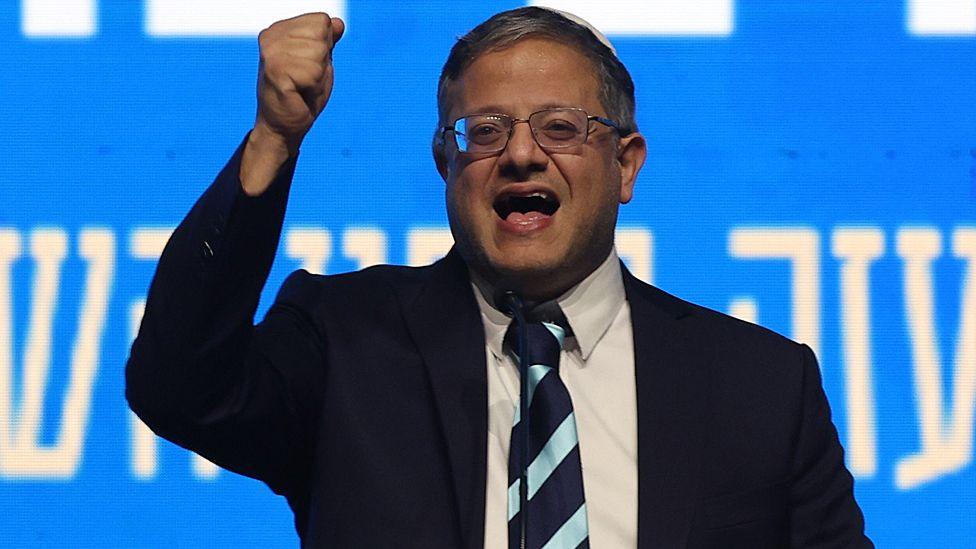
Israel's National Security Minister Itamar Ben-Gvir has backed a policy of encouraging Gazans to emigrate voluntarily
A pro-Palestinian human rights organisation made up of a network of experts and researchers around the world who monitor the conflict, Law for Palestine, has looked at cases where it believes Israeli officials and other public figures have incited genocide. Its list includes some statements by Israel’s far-right National Security Minister Itamar Ben-Gvir.
Mr Ben-Gvir has been advocating a policy to encourage Palestinians to leave Gaza, saying Israelis should settle there.
He leads an ultranationalist party which is widely criticised for espousing racially discriminatory, anti-Arab policies. He has previous convictions from an Israeli court - which date from before he entered government - for inciting racism and supporting terrorism.
Two days after the ICJ ruling in January, he advocated a policy to encourage Palestinians to leave Gaza and replace them with Israeli settlers. He said that to avoid a repeat of Hamas’s attack on Israel “we need to return home and control the territory [Gaza]… encouraging migration and giving the death penalty to terrorists”, proposing that any emigration should be voluntary.
“We consider the calling to displacement of the Gaza population as part of the ethnic cleansing that is ongoing in Gaza,” says Law for Palestine’s founder, Ihsan Adel. He believes those calls should be considered incitement to genocide, and that genocide is happening - an accusation Israel denies.
Not everyone agrees with his assessment, though. “I'm definitely not going to defend such statements, but they do not rise to the level of genocide,” says Anne Herzberg, a legal adviser at NGO Monitor, which reports on international NGO activity from a pro-Israel perspective.
Neither Mr Ben-Gvir nor Mr Vaturi responded to BBC requests for comment.
The link between what politicians say and what Israeli soldiers say was a core part of South Africa’s case at the ICJ.
In a YouTube video from late 2023, a group of Israel Defense Forces (IDF) soldiers can be heard chanting: “Occupy, expel and settle.” And soldiers have made other videos since the ICJ ruling in January mocking and celebrating the destruction of Gaza.
The IDF told us that it examines reports of videos online and that if a criminal offence is suspected, the military police investigate and “in some of the examined cases, it is concluded that the expression or behaviour of the soldiers in the footage is inappropriate, and it is handled accordingly”.
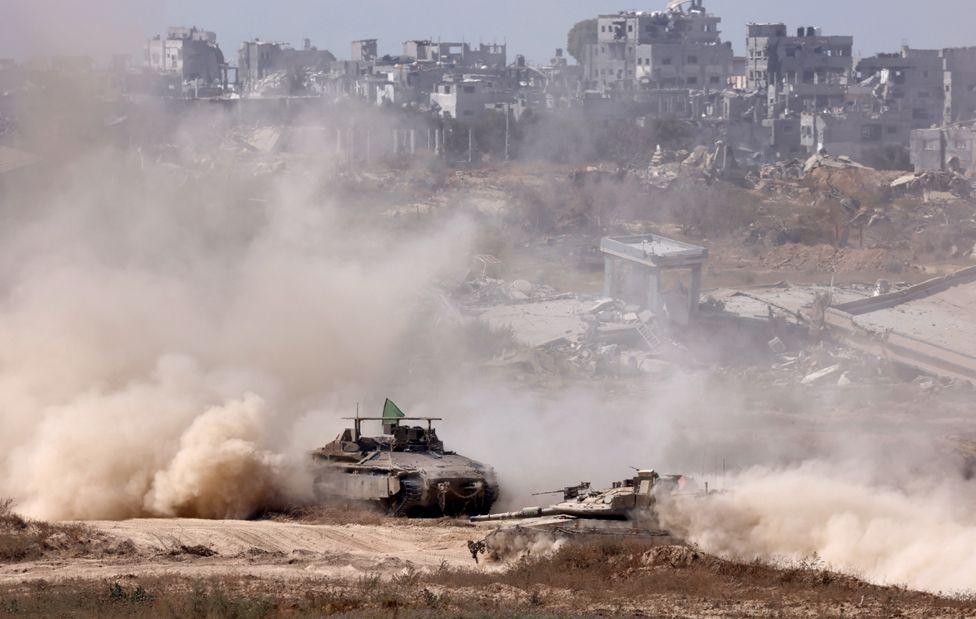
Israeli forces operating in the Gaza Strip in June 2024
The spotlight has also fallen on Israel’s religious leaders. Rabbi Eliyahu Mali attracted attention after he gave a talk in March at a conference for Israel’s Zionist yeshivas - Jewish religious schools with a strong belief in the State of Israel. Rabbi Mali is the head of a yeshiva that is part of a network that receives funding from Israel‘s Ministry of Defence. Its students mix Torah study with military service.
He described the talk as being about the “treatment of the civilian population in Gaza during the war”.
A clip of it was shared online. After citing a 12th Century Jewish scholar on holy wars, Rabbi Mali said: “[And if so] the basic rule that we have when we are fighting a mitzvah war, in this case Gaza, according to the scriptures, ‘You shall not let a soul remain alive,’ the explanation is very clear - if you don’t kill them, they will kill you.”
In Judaism, a mitzvah war is one which includes defending Jewish life and sovereignty and is considered obligatory as opposed to one of choice.
We contacted Rabbi Mali and a response, sent on his behalf, said that his words had been “grossly misrepresented by excerpts being taken out of context”.
It said that he had set out what the position was in ancient times but that he had “made it very clear that anyone following the Biblical commandment today would be causing the army and the nation extreme harm” and that under national law “it is forbidden to harm the civilian population from a child to an old man”.
We watched the full talk and on a few occasions he reminded the audience of those points, including in the conclusion, and also saying at the start: “You need to do exactly what the army orders say.”
However, during the talk, he specifically mentioned the people of Gaza saying: “I think there is a difference between the civilian population in other places and the civilian population in Gaza,” adding an unsubstantiated claim that “95% to 98% are interested in our demise, that's a majority, that's stupefying.”
When an audience member asked about babies he replied: ”The same… The Torah is saying: ‘You shall not let a soul remain alive’… Today he’s a baby, tomorrow he’s a boy, tomorrow he’s a warrior.”
In the talk, the rabbi also recounted what he said to his son, who went to fight after the 7 October attacks. He said he should “kill everything that moves”. He explained his position by adding that his son’s commander had told him the same thing and that he instructed his son to ”listen to the commander’s orders”.
Later, he reiterated that he did not expect soldiers to do what was laid out in the Torah. He said that if the laws of the state contradicted the laws of the Torah, it was the state law that should be followed and “the laws of the state only want to kill the terrorists and not the civilian population”.
Eitay Mack, a lawyer from the Israeli group Tag Meir that campaigns against racism and discrimination, says he has asked police to investigate the rabbi on suspicion of incitement to commit genocide, violence and terrorism.
He says he is still waiting to hear if the investigation he requested will be carried out.
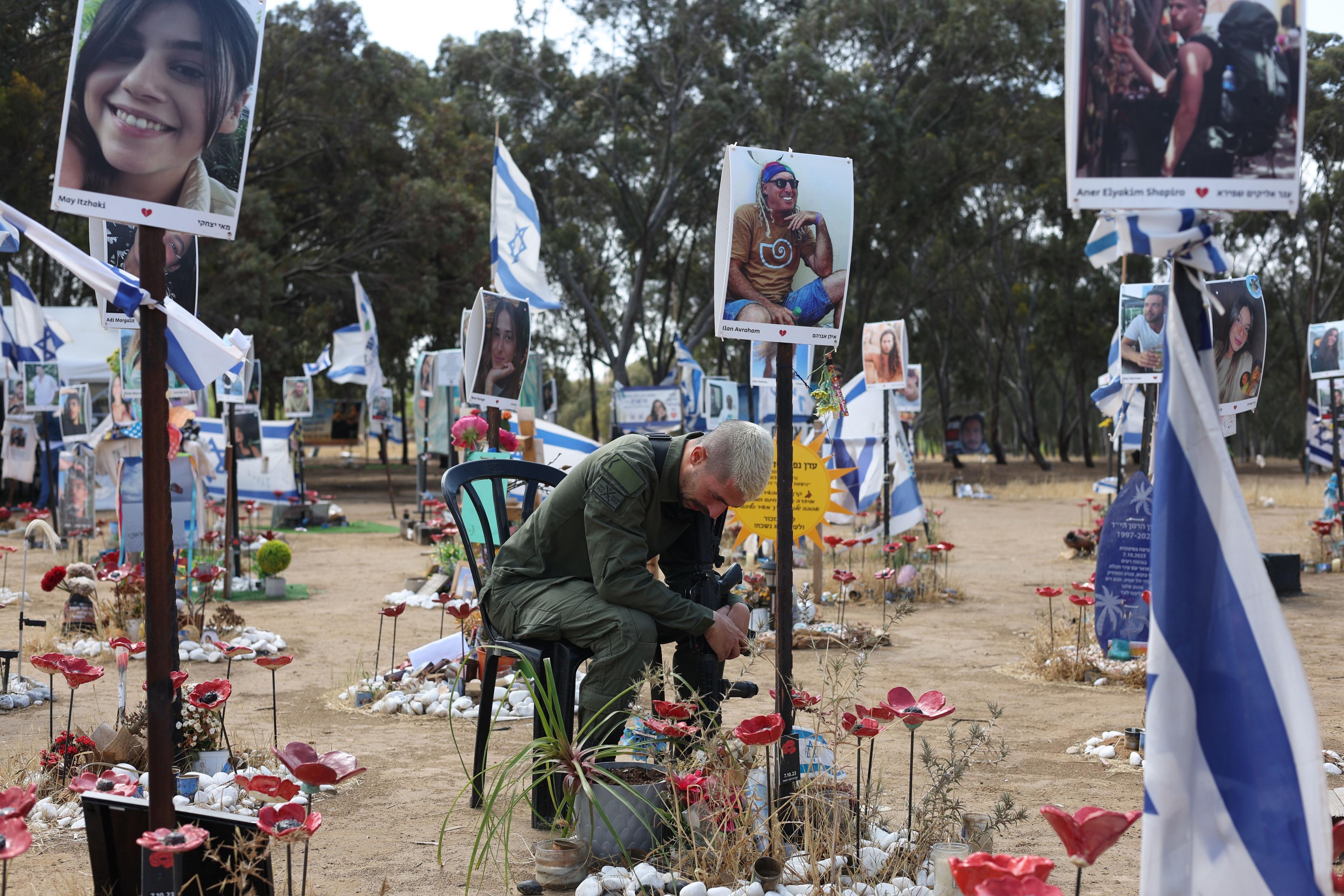
One of Hamas's targets on 7 October 2023 was Israel's Nova music festival
Another claim made by South Africa at the ICJ hearing was about “genocidal messages being routinely broadcast - without censure or sanction - in Israeli media”.
In February, on the right-wing Channel 14, journalist Yaki Adamker said: "The Gazans, as far as I am concerned, can starve to death. What do I care about them?”
In April, an Israeli journalist on the most-watched channel in the country, Channel 12, Yehuda Schlesinger, echoed similar sentiments, saying: “There are no innocents in the Gaza Strip, there aren’t. They voted for Hamas, they want Hamas.”
For Anne Herzberg, from NGO Monitor, this may show “a disturbing lack of empathy for people in Gaza and what they’re going through,” but “it’s not calling for genocide”.
The BBC contacted both broadcasters but received no response. Yehuda Schlesinger replied, highlighting the atrocities of 7 October.
When it comes to whether the authorities should regulate what is broadcast more tightly, Israeli human rights lawyer Michael Sfard warns that “regulators, which is the state, have to make sure that public broadcasting is not exploited” by people making provocative comments.
While the ICJ ruling on preventing inciting genocide was directed at Israel, Hamas has also been accused of making statements with “genocidal intent”.
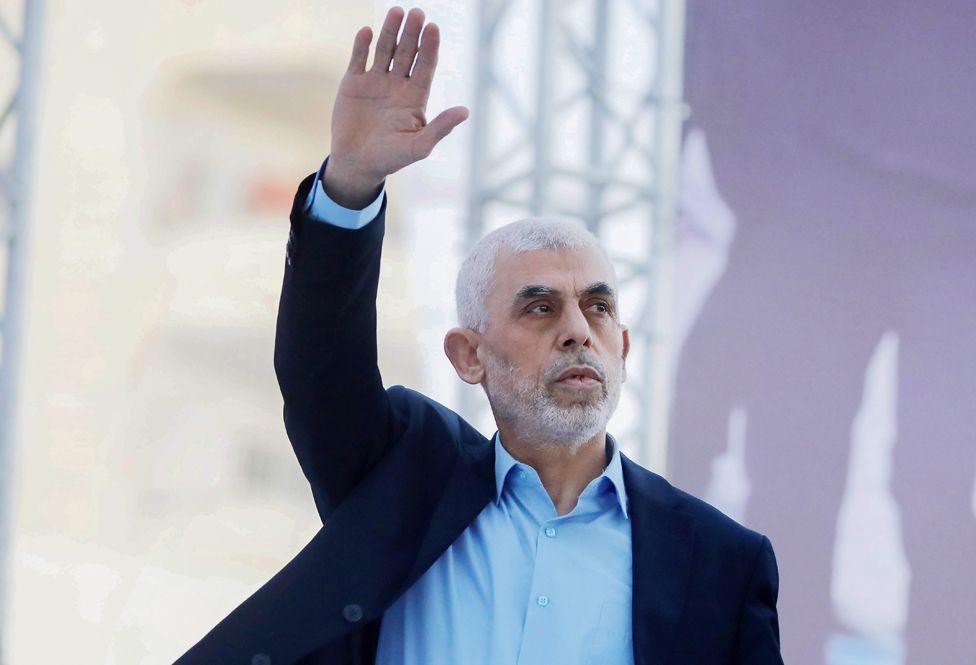
Yahya Sinwar became the overall leader of Hamas after Ismail Haniyeh was killed in Iran in July
“The annihilationist language of Hamas's charter is repeated regularly by its leaders,” says Tal Becker, legal adviser to Israel's Foreign Ministry.
In 2021, Yahya Sinwar, who has just become the overall leader of Hamas said: “We support the elimination of Israel through jihad and armed struggle, this is our doctrine.”
And, more recently, some Hamas officials have claimed they want to repeat the 7 October attacks, during which about 1,200 people were killed - mostly civilians - and 251 were taken hostage.
In November, a member of Hamas's political bureau, Ghazi Hamad, said: “We must teach Israel a lesson and we will do this again and again.”
Around the same time, Hamas leader abroad, Khaled Mashaal, said that 7 October “opened a highway towards eliminating Israel".
Hamas did not respond to the BBC’s request for comment.
Many want to see the group - which is proscribed as a terrorist organisation by the US, UK, EU and other countries - held to account.
“It’s quite clear that they do have genocidal intent, and we hear very little about investigating Hamas, and I think that's a real missing piece in this entire conflict,” says Anne Herzberg from NGO Monitor.
The UN’s special rapporteur on human rights in the occupied Palestinian territories, Francesca Albanese - whose own criticisms of Israeli actions have been strongly contested, in particular in Israel and the United States - agrees Hamas leaders should be held accountable. But she says: “When assessing genocide, one is to look at the words spoken by leaders, but also the capacity to commit genocide, which Hamas per se doesn't seem to have.”
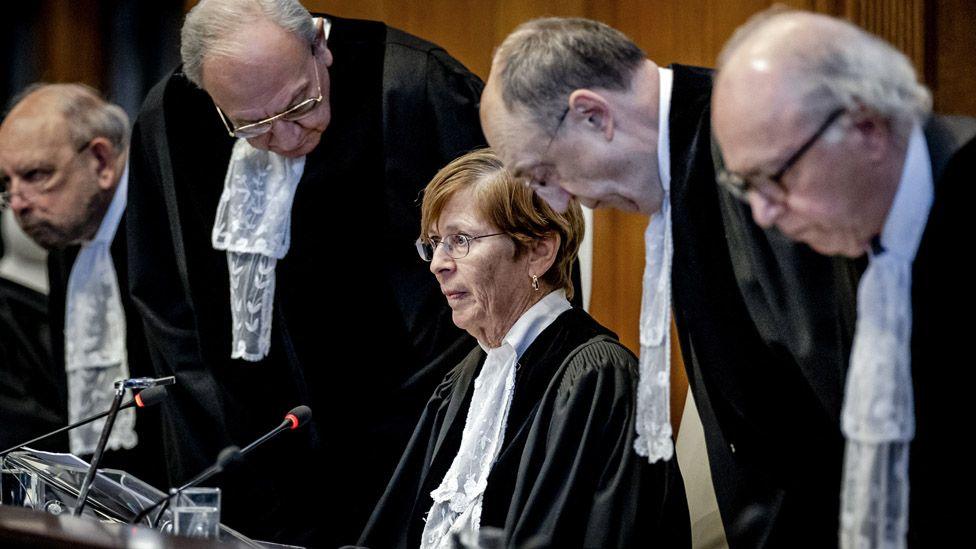
In January, the ICJ ruled that Israel must do everything possible to prevent genocide and incitement to genocide
Unlike Israel, Hamas cannot be taken to the ICJ because it is not a state. However a different body, the International Criminal Court (ICC), can hold individuals to account. In May its prosecutor applied for arrest warrants for Hamas leaders Yahya Sinwar, Mohammed Deif and Ismail Haniyeh (Haniyeh has since been killed in Iran and Israel says it killed Deif in Gaza) for crimes against humanity, and war crimes. He also sought warrants for Israeli Prime Minister Benjamin Netanyahu and Defence Minister Yoav Gallant. Both Hamas and Israel reacted with outrage.
As for what Israeli authorities are doing to prevent and prosecute people suspected of inciting violence, the country’s attorney general and state attorney have acknowledged that any statements calling for intentional harm to civilians “may amount to a criminal offence, including the offence of incitement”. Just before the ICJ hearing in January they said that several cases were being examined.
Recently however, Haaretz reported that the state prosecutor recommended that no criminal investigations be opened against senior public figures, including ministers and members of Knesset, who have "called to harm civilians in the Gaza Strip”. The final decision rests with the attorney general.
The BBC contacted Israel’s state attorney, police commissioner and Ministry of Justice for comment. Only the Ministry of Justice replied, saying they have to balance “the constitutional right to freedom of speech… while safeguarding against harmful incitement”. They added: “Law enforcement authorities constantly act to curtail incitement offences, and these efforts have been prioritised by Israel's attorney general in recent months.”
And as the ICJ continues to work toward a final ruling in its case, people continue to die - since October more than 40,000 Palestinians are reported to have been killed in Gaza, according to its Hamas-run health ministry.
Watch the full film from BBC News Arabic here, external.
- Published17 May 2024
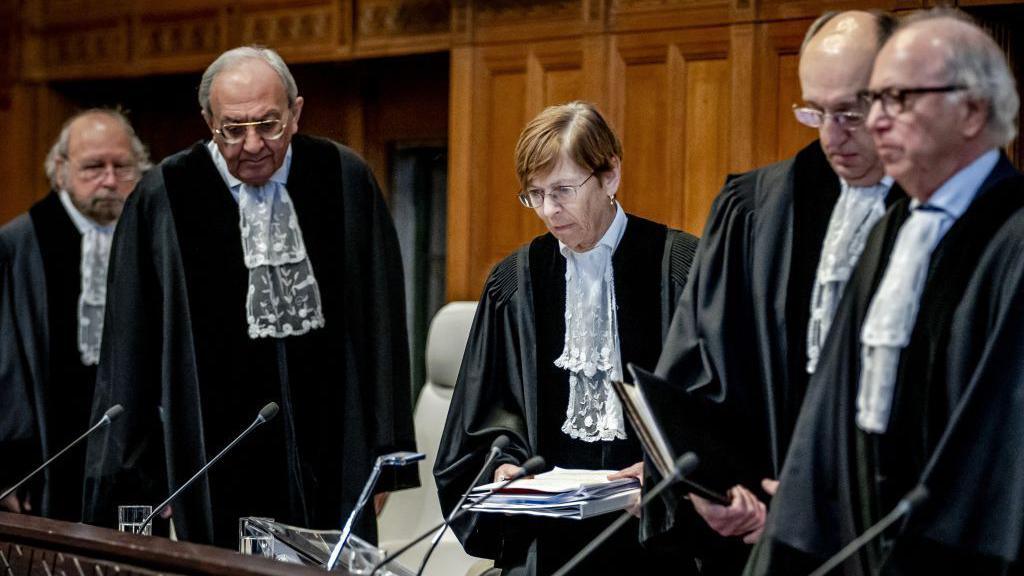
- Published24 May 2024
